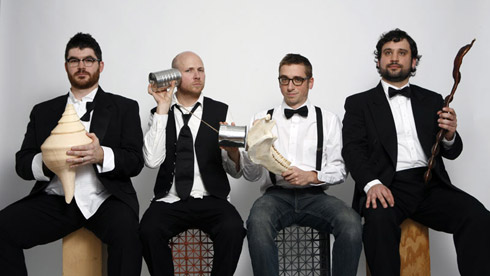An alternative American Songbook delivered by Upshaw and Sō Percussion

Dawn Upshaw performed music of George Crumb and Caroline Shaw with Sō Percussion Thursday night at the Kennedy Center.
Folk song, according to composer-scholar Zoltán Kodály, contains “the emotions of centuries.” The United States has only a couple of centuries under its belt, but its Appalachian hymns and gospel standards seem to fit the bill.
The quartet Sō Percussion, joined by soprano Dawn Upshaw and pianist Gilbert Kalish, explored the modern recontextualization of this revered music in a questing program Thursday in the Kennedy Center Terrace Theater.
The highlight of the program was on the second half, George Crumb’s sublimely quiet song cycle Winds of Destiny, published as the fourth part of the composer’s American Songbook series. Crumb drew inspiration from the (mostly) Civil War-era songs, accompanying them with a kaleidoscopic range of minimal scrapes and rattles of sound. The cycle became a signature piece for Dawn Upshaw, especially following her performance in a staged production directed by Peter Sellars at the Ojai Festival in 2011.
Textual indications point to a theme of war and death, both hopeful and despairing. The opening tune, “The Battle Hymn of the Republic,” is a call to or justification of war. Upshaw’s forthright singing of the tune, slowed down, rang out into a silence marked by curious sounds; these include the “thunder stick,” an aboriginal instrument whirled in a circle on a rope, and hushed vocal cries identified by Crumb as “the intermittent hooting of an owl.” A minor mishap getting the thunder stick going was the only perceptible lapse in Sō Percussion’s masterful work creating a vast tapestry of exotic sounds.
More martial percussion accompanied most of “Johnny Comes Marching Home,” the tune echoed by seemingly happy whistling. Crumb’s quotation of the funeral march tune from Mahler’s First Symphony in the last verse, however, made it clear that, for many families, Johnny was not going to be marching home. Upshaw’s voice has lost some of its sheen, but her musicality and poise have deepened even further, as in the work’s climax, the ecstatic “Twelve Gates into the City,” accompanied by raucous tintinnabulation.
An instrumental interlude led to the crushingly sad “All My Trials (Death’s Lullaby),” after which the cycle took a turn toward the odd. The jubilation of “Go Tell It on the Mountain” seemed less sincere, and the mouth harps and flexatone suited the creepy Sprechstimme of Upshaw’s voice in “The Enchanted Valley.”

Sō Percussion
Caroline Shaw wrote her Narrow Sea as a companion piece for the Crumb work, using only the words and not the melodies of five other folks songs. Her use of percussion doesn’t range as widely as Crumb, featuring bowls of various kinds struck with mallets or with water poured from one to another. The most striking moment in the piece came in the fourth and fifth songs, when two and then all four percussionists surrounded the lidless piano, striking inside the case with mallets and hands as Kalish continued to play at the keyboard. In a saccharine gesture, the first song returned as a postlude.
Bryce Dessner’s inventive but ultimately repetitive Music for Wood and Strings did not fit well into this theme. Sō Percussion plays the work on four amplified cord sticks, instruments constructed by Aron Sanchez to Dessner’s specifications. They are like dulcimers of various sizes, but played with #2 pencils and child-sized violin bows, combining “the sound world of an electric guitar and dulcimer with the percussionist’s toolkit,” as the composer put it.
The clanging, nasal sound they produce made some of the faster sections sound like the title music to some 1970s television show, but the rhythmic drive and pitched hollowness are catchy and unclassifiable. A range of other percussion, including snare and wood blocks, as well as a bass drum played by pedal, relieved the occasional monotony of timbre. This concert featured only about two-thirds of the piece, without anything being missed. Perhaps a permanent cut is in order.
